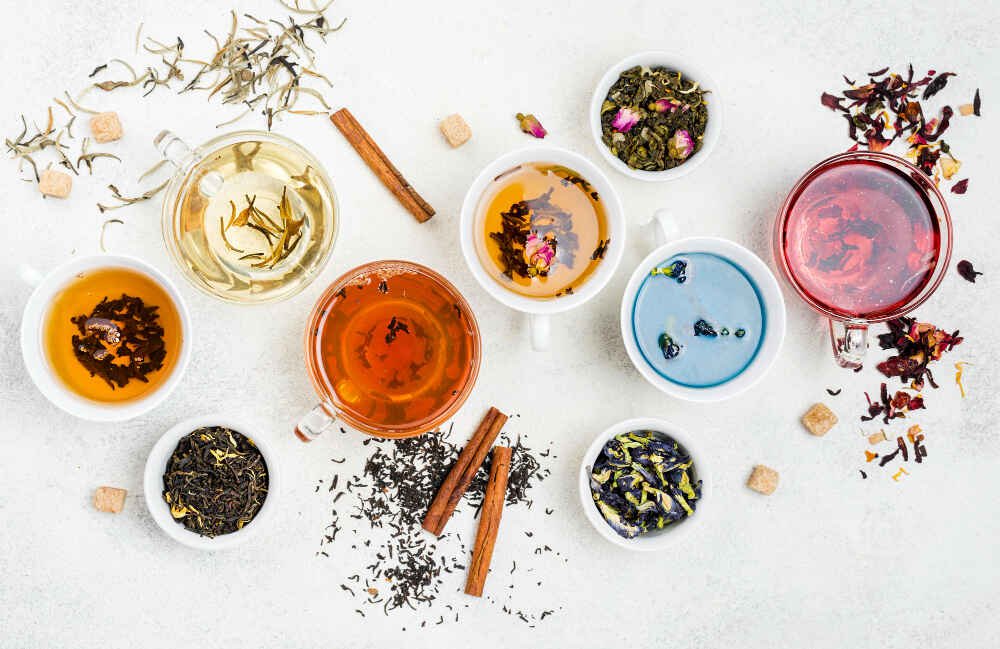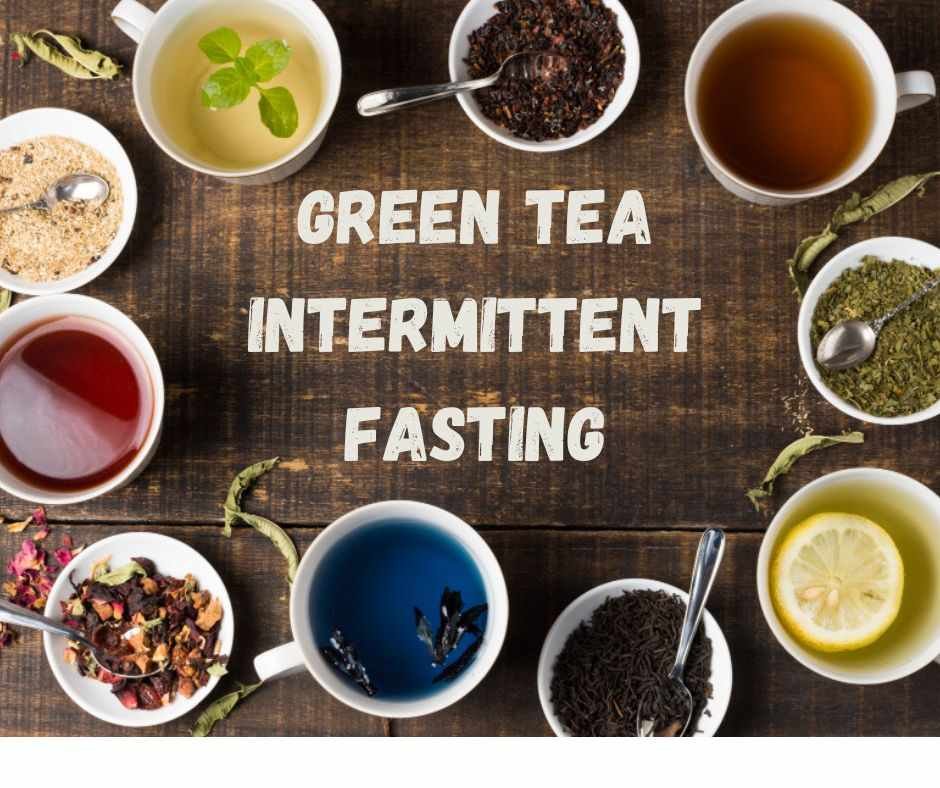Why Green Tea Intermittent Fasting Works So Well Together
Intermittent fasting has taken center stage in the health and wellness world by highlighting its potential benefits. But what if a simple cup of green tea could supercharge your intermittent fasting routine? Packed with antioxidants and metabolism-boosting properties, green tea is the ideal drink to enhance intermittent fasting benefits. When combined with intermittent fasting, green tea not only helps curb hunger but also accelerates fat burning and boosts your energy levels. Sipping unsweetened green tea during your fasting window not only curbs hunger pangs but also supports fat burning, boosts your energy levels, and enhances overall health.

Let’s take a closer look at how green tea can truly elevate your fasting routine.
What Is Intermittent Fasting, and Why Add Green Tea?
Intermittent fasting (IF) is not a diet. It’s an eating pattern. Popular intermittent fasting methods like the 16/8 or alternate-day fasting involve periods of eating followed by periods of fasting. The key goal? Enhancing fat oxidation, improving insulin sensitivity, and managing calorie intake.
Here’s where green tea becomes a great option:
Zero calories: Perfect for the fasting window.
Rich in EGCG (epigallocatechin gallate): Known for accelerating fat loss.
Supports metabolic health: Especially important if you’re managing blood glucose or trying to reduce the risk of heart disease.
Is Green Tea Fasting-Friendly? Let’s Break It Down
Yes, absolutely, green tea is one of the smartest drinks you can have during intermittent fasting, and here’s why: it’s naturally calorie-free, packed with gentle caffeine, and loaded with powerful antioxidants that support your energy, metabolism, and focus. It won’t break your fast, and it actually helps you get more out of it. That’s why so many people swear by sipping green tea to make fasting easier, smoother, and more effective.

Let’s break down why green tea and intermittent fasting are such a powerful combo.
Why Green Tea Intermittent Fasting is Your Best Ally
In the case of the benefits of fasting, green tea is generally considered safe and beneficial to consume, offering potential advantages without breaking the Intermittent fasting routine.
It Doesn’t Break Your Fast
Green tea benefits for fasting which contains zero calories, making it an excellent option for those looking to maintain their fast. It won’t spike your insulin levels or disrupt your digestion, ensuring that you stay in the fasting process for optimal fat burning and energy production.
Avoid artificial sweeteners, honey, or milk. They might seem harmless, but they can affect your insulin response and blood glucose.
Metabolism Boost & Fat Oxidation
Green tea contains caffeine and catechins like epigallocatechin gallate (EGCG). Together, these compounds help increase fat oxidation, support energy expenditure, and gently raise your metabolic rate, especially beneficial during a fasting period.
“Green tea catechins combined with caffeine may enhance fat oxidation during moderate-intensity exercise.” PubMed Study – PMC4517022
Powerful Antioxidant Support
Green tea is antioxidant-rich. Catechins and polyphenols in unsweetened green tea reduce oxidative stress, help clear free radicals, and support your immune system. This becomes crucial during long fasts, where your body enters a mild stress state.

Keeps Hunger Pangs at Bay
Green tea is warm, soothing, and naturally appetite-suppressing. Drinking cups of green tea can calm hunger pangs, making longer intermittent fasting schedules more bearable.
Zero Calories
Green tea is calorie-free, so it won’t disrupt your caloric intake and can be enjoyed guilt-free during fasting. Drinking green tea keeps you hydrated, crucial when you’re avoiding food and depending on fluids to maintain your energy levels.
why hydration during intermittent fasting is important and how you can improve it during your fasting journey? – Intermittent Fasting Water intake – 5 Best healthy drinks
Sustained Energy Without the Crash
Thanks to less caffeine than black coffee or energy drinks, green tea offers a sustained energy boost without jitters. Many fasters report replacing their morning coffee with green tea during their fasting window.
Supports Heart and Metabolic Health
The potential health benefits of green tea go beyond fasting; it’s linked to improved heart health, better insulin sensitivity, reduced blood sugar levels, and a lower risk of type 2 diabetes and heart disease.
“Green tea isn’t just fasting-friendly, it may actively enhance your metabolic health.”
Key Benefits of Drinking Green Tea While Fasting
| Benefit | Description |
|---|---|
| Fat Burning | EGCG + caffeine enhances fat oxidation and energy expenditure. |
| Curbs Hunger | Helps reduce hunger pangs and stabilizes blood sugar levels. |
| Boosts Cognition | Improves cognitive function and focus during fasting. |
| Lowers Insulin | May improve insulin sensitivity and reduce insulin resistance. |
| Protects Cells | Rich in antioxidants to reduce oxidative stress. |
| Supports Heart Health | Lowers cholesterol, blood pressure, and reduces the risk of heart disease. |
Scientific Backing: A study published by the National Institutes of Health found that catechins in green tea improved fat metabolism and reduced body weight.
Just think: You’ve been fasting for several hours, your energy is dropping, and those hunger pangs are creeping in. Instead of reaching for a snack, you sip on a warm cup of green tea. Within minutes, the cravings subside, and your focus sharpens. That’s the magic of green tea during fasting.
“Green tea catechins have demonstrated beneficial effects on body weight, lipid metabolism, and fat absorption, especially during fasting.” – NIH Study.
Watch Out For:
- No Additives: Skip sugar, artificial sweeteners, honey, or milk. These break your fast.
- Empty Stomach Sensitivity: Some people experience discomfort from green tea on an empty stomach. Try milder brews or time it closer to your eating window.
To know the list of best green teas that could support your intermittent fasting Journey, then this can help you – Best Tea for Intermittent Fasting – 7 Teas to Boost Your Health
Green Tea vs. Other Herbal Teas
While green tea is in the spotlight, other herbal teas and caffeinated teas also enhance the fasting experience. Here’s how green tea compares with other herbal teas during a fast:
| Type of Tea | Caffeine Content | Calories | Fasting Safe | Notable Benefits |
|---|---|---|---|---|
| Green Tea (Japanese green tea, matcha tea) | Moderate | 0 | ✅ Yes | EGCG, antioxidants, mild energy |
| Black Tea | High | 0 | ✅ Yes | Bold flavor, Strong, rich flavor; good for those used to morning coffee. |
| White Tea | Low | 0 | ✅ Yes | Subtle taste, Less caffeine, high in antioxidants |
| Peppermint Tea | None | 0 | ✅ Yes | Soothes digestion, curbs appetite, naturally calming |
| Ginger Tea | None | 0 | ✅ Yes | Anti-inflammatory, supports gut health, helps digestion, and reduces nausea. |
| Chamomile Tea | None | 0 | ✅ Yes | A gentle, relaxing option with zero calories. |
| Oolong Tea | Moderate | 0 | ✅ Yes | Boosts metabolism and helps with weight management, traditional in Japanese culture. |
| Herbal Infusions | Varies | 0 | ✅ Yes | Variety of options, great daily drink |

Choose the best tea based on your fasting goals and personal preferences. “Green tea is a natural companion for the fasting process. With zero calories and proven fat-burning benefits, it helps your body stay in the fasting state while feeling alert and light.
Herbal Teas vs. Green Tea: Which Is Better for IF?
It doesn’t have to be a competition. In the world of teas, herbal teas bring their own set of numerous health benefits:
- Peppermint tea: Great for digestion.
- Ginger tea: Combats inflammation.
- Chamomile tea: Calms the nervous system.
“Think of herbal teas as supportive friends during your fasting journey – calming, caffeine-free, and full of plant power.”
Include both for variety and targeted fasting goals.
How Much Green Tea Can You Drink During Fasting?
You might wonder: How many cups of green tea are too much? Most people can safely enjoy 3 to 5 cups of green tea daily. Just make sure to listen to your body.
A tip to remember: Too much tea on an empty stomach can cause mild nausea due to tannins. Pair it with hot water first or switch to herbal infusions.

“Matcha powder contains more caffeine and antioxidants than regular green tea. It can give you sustained energy during your fasting period.”
When’s the Best Time to Drink Green Tea While Fasting?
Timing can amplify the potential health benefits:
- Morning: Start your day with a warm cup of tea by replacing your cup of coffee to wake up your system and ease into your fast. As coffee can increase the glucose levels in your body.
- Mid-Fast (2-4 hours in): Helps control cravings and maintain focus.
- Pre-Workout: For those following intermittent fasting schedules with workouts, green tea before training can enhance energy levels and fat burning.
If you’re doing an 8-hour window or alternate-day fasting, spacing out your cups of green tea helps curb hunger and stabilize energy.
Try This: Add a dash of lemon juice to green tea; it boosts flavor and increases antioxidant absorption.
You can also read about how workouts or lifting weights can benefit your muscle growth intermittent fasting routine – Lifting Weights While Intermittent Fasting – 5 Benefits of Fat Loss and Muscle Growth
Real-Life Fasting Experience: Reddit Speaks
On Reddit’s intermittent fasting forums, users often mention how switching from morning coffee to green tea helped reduce insulin response, especially during longer fasts.
One user wrote:
“Green tea gives me that alertness without the coffee jitters. Plus, no bloating.”
Personal Preferences Matter
Some people tolerate caffeinated teas better than others. If you find green tea too bitter or strong, consider rotating with plain tea, white tea, or low-caffeine herbal teas like chamomile or peppermint.
Always choose tea bags or loose-leaf tea with no additives or flavors. Check the label for zero calories and no hidden sugars.
Green Tea vs. Black Coffee – Which Is Better During Fasting?
- Black coffee is strong, bitter, and boosts adrenaline. Great for intense focus.
- Green tea is gentler, with amino acids that promote calm alertness.
Try both, and adjust based on your daily routine, mood, and energy needs.
Game-Changer Book for Every Woman
If you’ve been doing everything right but still feel stuck, it’s not you; it’s your hormones trying to protect you. Intermittent Fasting for Women isn’t about forcing your body into a mold; it’s about working with it.
This isn’t just another diet; it’s a smarter, gentler approach to break through weight loss plateaus, boost your energy, and find balance, no matter where you are in life. Whether you’re battling cravings, stress, or just feeling frustrated, this guide helps you tune in to what your body truly needs, without guilt or burnout.
Stop fighting against your body. Start feeling confident, energized, and healthy again. This book shows you how to embrace a sustainable, long-term approach to health, one that works with your body, not against it.
Can I add lemon juice to my green tea while fasting?
Yes! Lemon juice adds flavor and vitamin C without breaking your fast.
Can I drink green tea every day while intermittent fasting?
Absolutely. Making it part of your daily routine can enhance both your fasting goals and cognitive function thanks to its antioxidants and gentle caffeine.
Does green tea break a fast?
Not at all. As long as it’s unsweetened green tea, it contains zero calories and keeps you in a fasting state.
How does green tea affect insulin levels?
It may help reduce insulin resistance and improve insulin sensitivity, making it an excellent option for metabolic health.
How much tea is too much?
3–4 cups of green tea a day is ideal. More than 5 may cause side effects like an upset stomach or irritability, especially if consumed on an empty stomach.
Is green tea safe for people with medical conditions?
In most cases, yes. But those with heart conditions or on medications should consult a doctor first.
Is green tea better than black tea for fasting?
Depends on your goals. Black tea has more caffeine, while green tea offers more EGCG and antioxidant support. Both are safe.
Can I combine green tea with black coffee?
Yes — many fasters alternate between black coffee and green tea throughout the day. Just monitor your caffeine intake to avoid crashes.
What are the best intermittent fasting methods to pair with green tea?
The 16/8 and alternate-day fasting methods are great. Green tea helps bridge long fasting periods and supports sustained energy.
What about water fasting? Does green tea still count?
Technically, water fasting excludes everything but water. But many protocols allow plain tea, like green tea, due to its zero calories.
Conclusion
Green tea is a perfect companion for intermittent fasting, supporting your weight loss goals while providing numerous health benefits. With its fat-burning properties, improved metabolism, and hunger-suppressing effects. All in a daily drink, you can easily build into your fasting routine. Without a doubt, green tea is a drink you can easily incorporate into your intermittent fasting schedules by improving insulin resistance to calming hunger pangs, and even aiding fat oxidation. it’s a natural, easy addition and a good idea to any fasting regimen.
Ready to elevate your fasting game? Brew yourself a cup of green tea and feel the difference in your energy, metabolism, and hunger cravings. Share this guide with a friend who’s ready to join the intermittent fasting journey! To have a better fasting experience with intermittent fasting, it might be time to brew that cup of tea. Try different types of tea, experiment with personal preferences, and find what supports your fasting goals.



